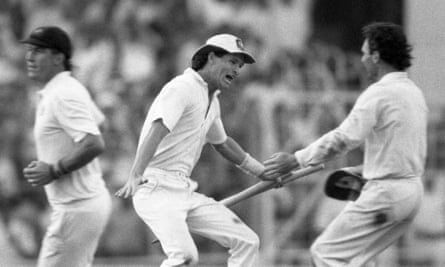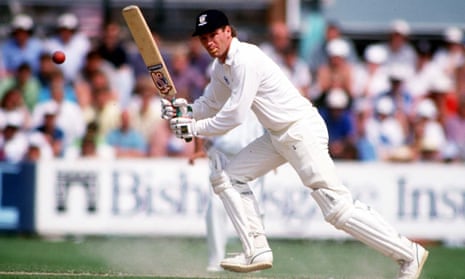Dean Jones, who died suddenly in Mumbai where he had been doing media work on the IPL, was never one of those Australians who seemed to be riddled with self-doubt. Maybe this is why in recent years he spent so much time on the modern T20 circuit as a pundit, not noted for his discretion, and also as an old-fashioned, no-nonsense coach, most recently for Karachi Kings in the Pakistan Super League.
However Jones will, rightly, be remembered more for his prowess as a cricketer in the 1980s and 1990s. He was in the vanguard of Australia’s revival. Back in 1984 the side were in the doldrums; Kim Hughes’s tormented period in charge was about to come to an abrupt end and the team needed fresh talent, energy and self-belief, qualities that Jones soon provided in abundance. He always gave the impression he had few doubts about his capacity to succeed at the highest level.
Soon after the appointment of Allan Border as captain Jones became a linchpin in the Australia side. He bristled at the crease; he was instinctively aggressive yet also a fluent strokemaker, easy on the eye. All batsmen are vulnerable at the start of an innings yet when Jones entered the arena he sought to display an intimidating presence even before facing a ball, a man about to shred the bowling attack. Often his dismissal would be celebrated more vigorously than those of anybody else.
He ended up playing 52 Tests, which seems a surprisingly small number since he averaged more than 46 in this format.
It may be that his provocative manner shortened his career, which contained many highlights. His most memorable innings was at Chennai in 1986 in the second Test match ever to end in a tie. There, in sweltering heat, he scored 210, after which he ended up in hospital on a saline drip.
Jones must have been struggling because he suggested that he might retire ill, which prompted the response from Border: “If you can’t hack it we’ll get a tough Queenslander out there.”
Jones, despite needing to vomit now and again, kept on batting. The coach, Bob Simpson, who generally shunned hyperbole, described this as the greatest innings by an Australian. After hearing of Jones’s death, Border tweeted: “He was one of the greatest natural cricketers I’ve ever seen.”

In one-day cricket Jones was equally effective and something of a revolutionary and he would end up playing 164 matches for Australia with an exceptional record. He was lightning fast between the wickets, a brilliant outfielder with a fine arm and he would sometimes move down the pitch before the bowler delivered, a common tactic now but an unusual one in that era.
He was not shy of antagonising his opponents. Most famously, in 1993, near the end of his career, Jones asked Curtly Ambrose, the great West Indies fast bowler, to remove the wristband on his bowling arm. Perhaps the wristband was distracting the batsmen; more likely Jones wanted to rile Ambrose, which might mean he lost his metronomic line and length in a one-day international. The ploy backfired. Ambrose was unimpressed; he finished with five for 32 in that match; later in the series the West Indian had a spell of seven for one in a Test match in Perth. Jones was almost certainly unrepentant and by then he had been dropped from the Test side, to his obvious dismay.
He finished his career in England. He had a fling – and quite a fling it was – with Durham in 1992 alongside Ian Botham in the autumn of his career. He also captained Derbyshire in a typically forthright manner, scoring runs and leading them to second in the Championship in 1996, but he resigned the following year, having lost the support of the dressing room. Somehow this was not a complete surprise.
Jones was always a proud Victorian and a charismatic presence on the field. He was abrasive; he spoke his mind with force and clarity, a brilliant batsman and a guileless character, who will be much missed by the cricketing fraternity. Somehow he brilliantly epitomised our perception of an Aussie cricketer of that era.

Comments (…)
Sign in or create your Guardian account to join the discussion